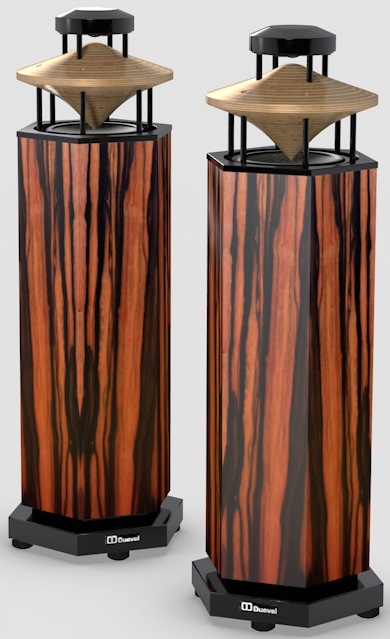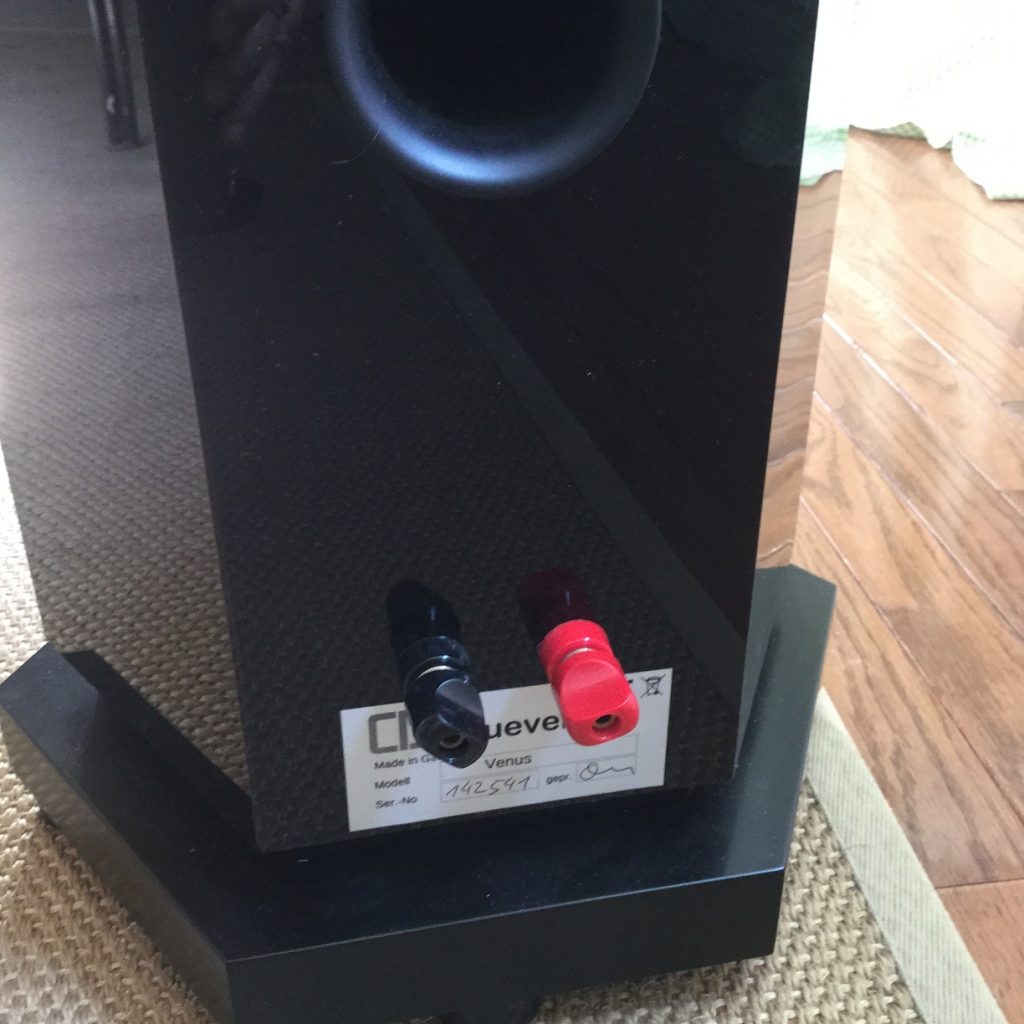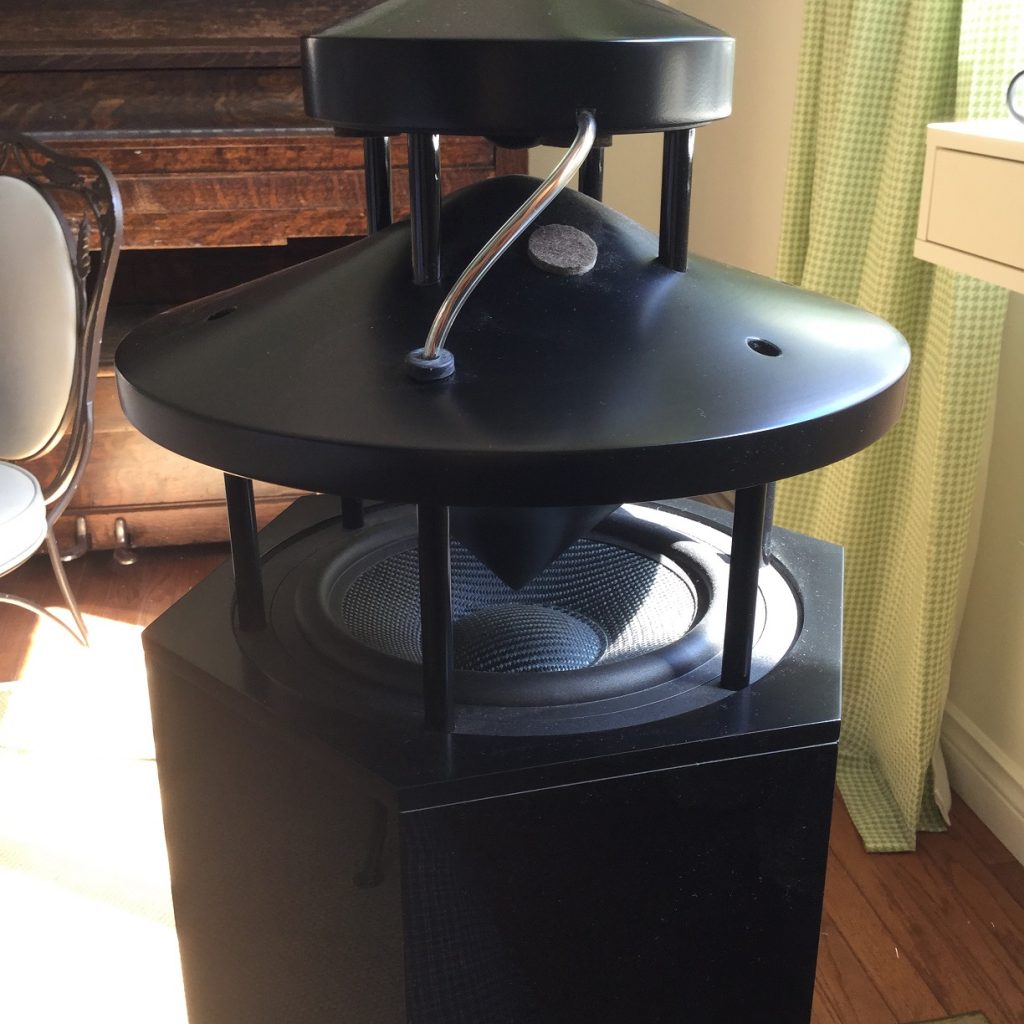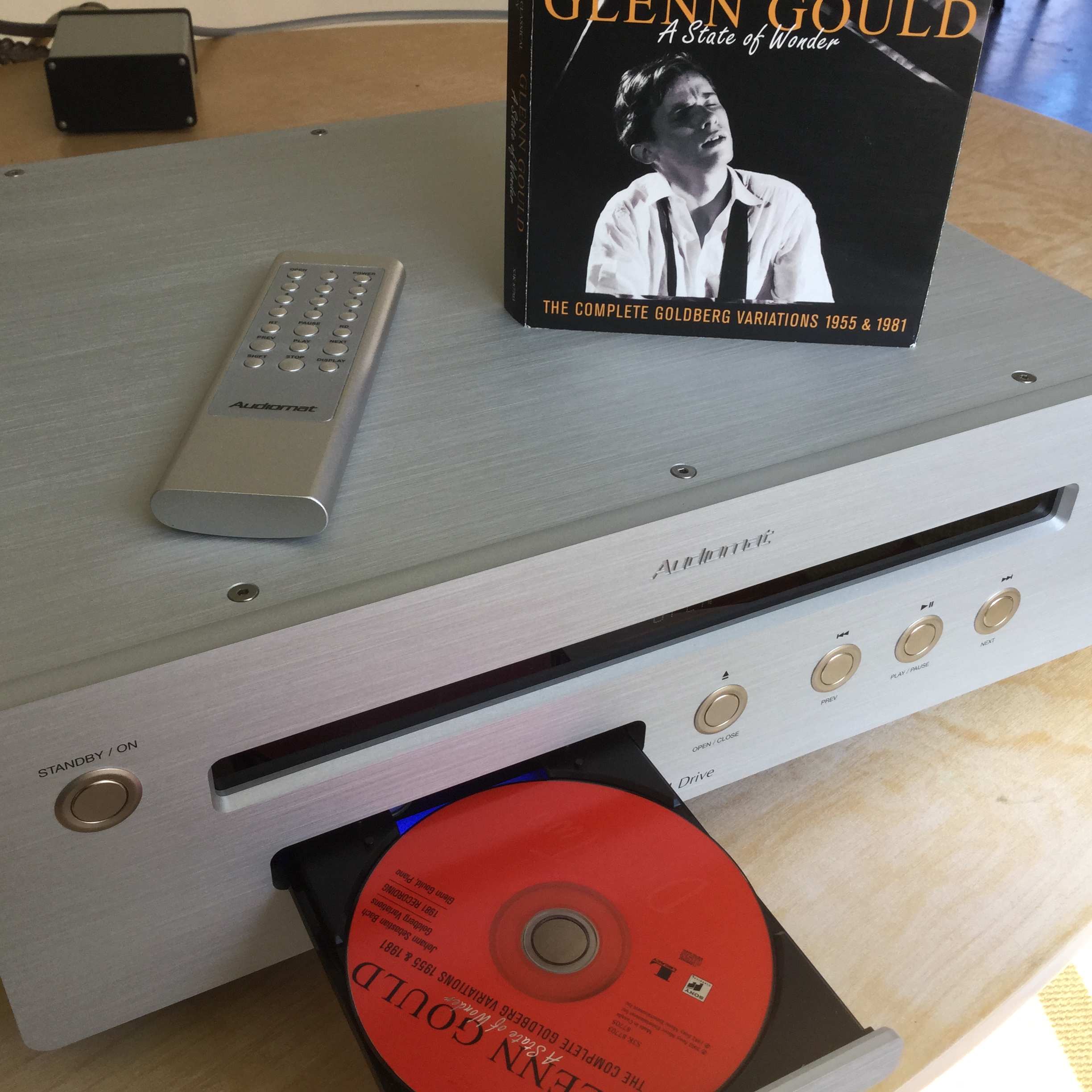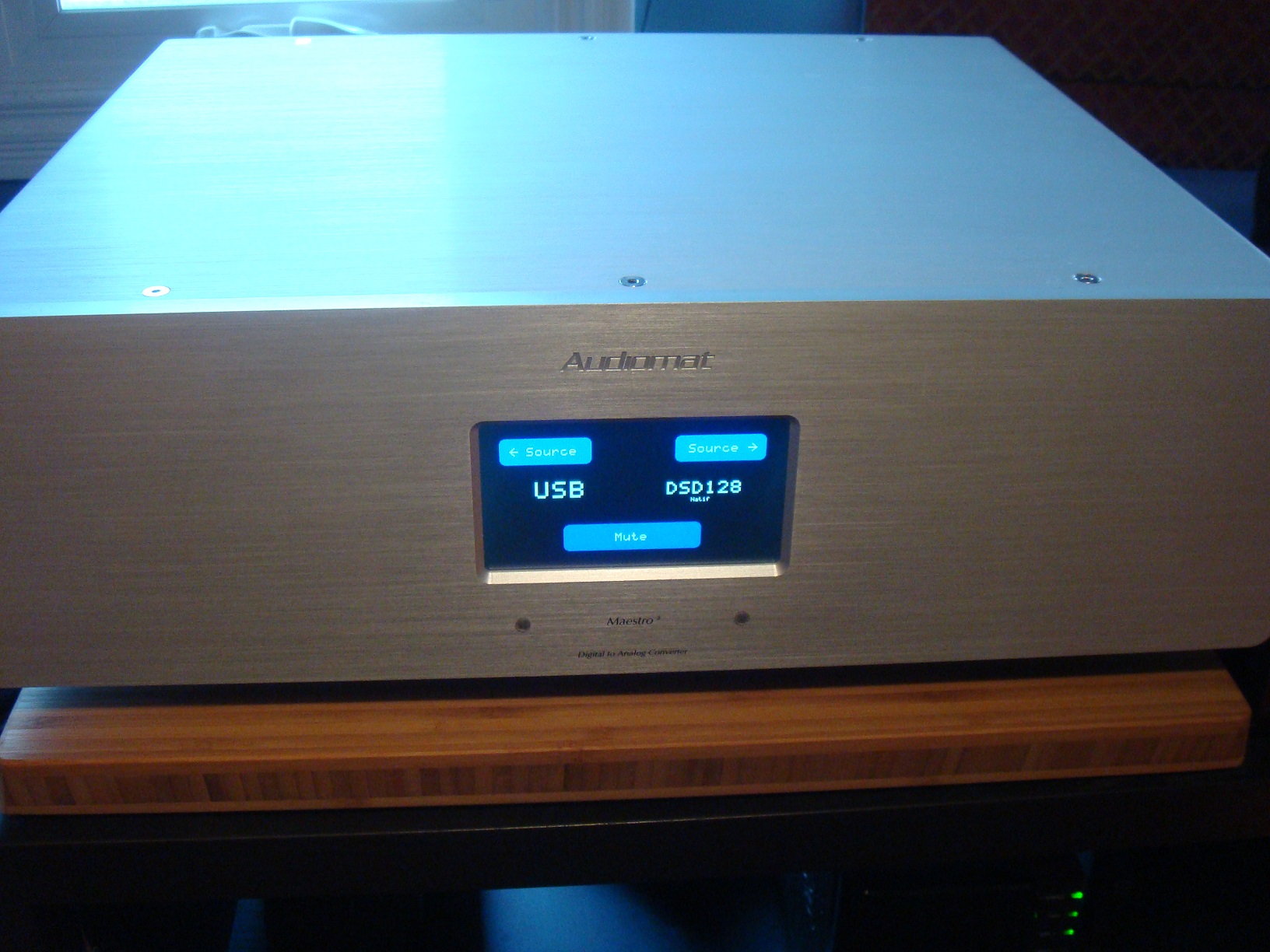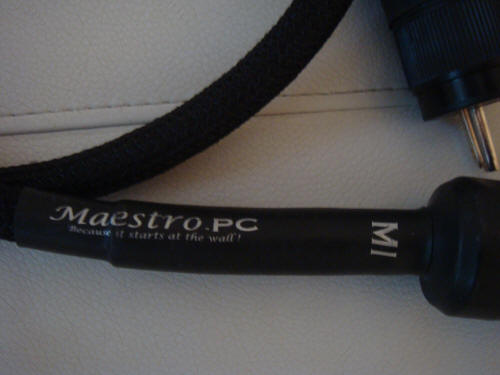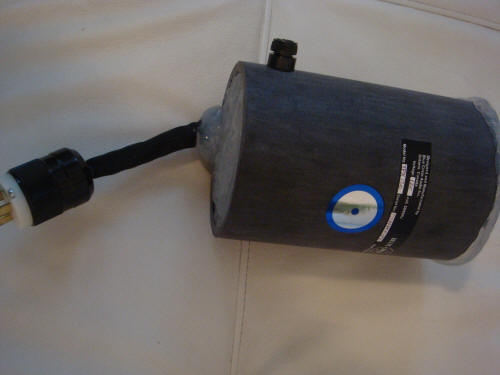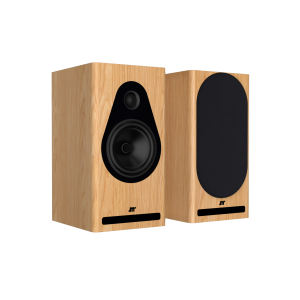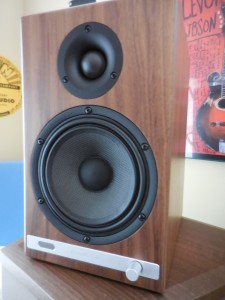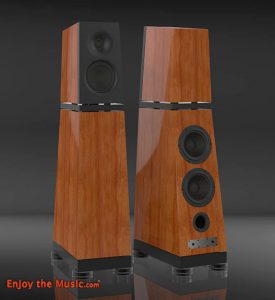The Venus is the third Duevel speaker I have reviewed and sits directly in the middle of their lineup. Since I have heard at one time or another all of Duevel's models, the Venus just might offer the biggest bang for the asking price. Let's find out.
As with all Duevel speakers, the Venus is omnidirectional. From my Duevel Enterprise review HERE, "Why disperse sound in a 360 degree pattern? According to this smallish German firm, the human brain has difficulty in differentiating between direct and indirect sound of more common forward-firing speakers thus causing listener fatigue over time. With Duevel's omnidirectional designs, the listener's room boundaries are deliberately energized to produce a more reverberant field not unlike what one would expect in a concert hall. Duevel believes this radiation pattern is more natural and therefore more easily processed by our brains"
The six-sided cabinet of the Venus is just over a meter tall and is ported to the rear. An 8" carbon-fiber woofer fires up into a nicely finished wood saucer shaped radiator that disperses sound over 360 degrees. A 1" soft-dome tweeter fires down onto the top surface of the radiator. Note that the radiator is shaped differently on top and bottom to optimize the unique sound wave characteristics of both drivers.
The claimed sensitivity is 88dB and impedance is 4 Ohms. According to Duevel, real in-room sensitivity should be higher as the normal measuring procedure only captures a fraction of the acoustic output of an omnidirectional speaker as the Venus. Indeed, my 30-watt Audiomat Opera Reference amplifier had little difficulty driving the Venus to whatever volume I wanted. Of course this combo is not what I'd recommend for those who desire Metallica played at concert volume levels.
The Venus sports a single set of plastic yet robust binding posts that are among the nicest I have seen.
Several wood finishes are available. My review loaner was piano black, while stunningly attractive, was difficult to photograph not to mention impossible to keep dust and finger print free. Thus if my photos do not do the Venus justice, rest assured it was a superbly constructed and finished loudspeaker.
The Venus sits on hard rubber feet which are threaded for those who wish to monkey around with aftermarket feet, spikes and whatnot. I stuck with the stock feet.
I positioned the Duevels pretty much in the same spot as with most speakers I have sampled; roughly three-and-a-half feet from the back wall and two-and-a-half feet from the side walls. They were remarkably easy to position as their omnidirectional radiation pattern interacts with the room to a higher degree as do more traditional forward firing speakers which tend to attenuate their off-axis response. I would caution users not to go crazy with acoustic room treatments especially overly absorbent materials on the walls at the speaker end of the room. For the Duevels to work their magic, they require suitably reflective surfaces which runs completely counter to conventional thinking. Screw conventional thinking. When it comes to audio, I have found over the years that most such beliefs to be nothing more than bovine scatology.
Forget what you think you may know about omnidirectional speakers. Duevel speakers do not float a massive phasey soundstage lacking in focus and detail. Far from it. They present a remarkably focused soundstage. What they won't do is present that etched in stone precise image that many audiophile speakers display. To my ears, such precision is unnatural and merely a sonic trick, however attractive. Go to any live performance and you'll be hard pressed to hear that sort of thing. Things like tone, texture, presence and a sense of forward motion are more important to me than sound effects. But who am I to tell you what you should look for in a speaker? If you get off on razor sharp images floating in space, look elsewhere. Too bad because you'll be missing out on an exceptionally engaging and natural sounding speaker.
As with the Enterprise and Planets, sound did not appear to come from the speakers or the space in between but from the entire room. This resulted in a significantly wider sweet-spot than most speakers offer. Not surprisingly the so-called sweet spot was pretty much anywhere in the room and yet imaging and tonal balance were consistently focused. This was nothing like the swimmy, hazy soundstage I have heard with many bipolar speakers which attempt to do the same thing but fail miserably.
Pace and forward momentum was also exceptional with the Venus. While not what I would call laid back neither were they overly forward. In fact natural and balanced were the words that most readily came to mind. It was difficult to find anything missing with the Venus. Sure, in absolute terms they could go louder with greater bandwidth and extension but for that look to Duevel's larger, more expensive Bella Luna. However, the Venus is so carefully and seamlessly balanced, it was impossible to be anything less than satisfied with what I was experiencing with these black beauties in my listening room.
Did I mentioned how supremely listenable they were? The only speakers that have provided anywhere near the degree of fatigue-free listening for me were either by Green Mountain Audio or now defunct Meadowlark Audio. Interesting that all three brands claim particular attention paid to phase linearity and minimalist crossover designs.
While not possessing laser cut image precision, I never once thought the Venus was deficient in that way. Instrumental and vocal images came across remarkably focused, lifelike and set naturally in a realistically scaled soundstage assuming of course the recording was accommodating in that regard.
Listening to Bach's Mass in B Minor is pretty much akin to going to church for me (as is Elgar's Dream of Gerontius) and like all great music provokes all manner of thoughts and emotions. A favorite recording is Jos Van Veldhoven's exceptional performance on Channel Classics. While I started with the intention of focusing in on how the Venus handled large scale choral works, my mind quickly began to wander and instead got caught up with Bach's genius, the beauty of his musical lines, the performance itself as well as the passion and feeling so evident on this recording. Touch and phrasing was wonderful and there was a real sense of discovery and spontaneity in this recording that I hadn't quite noticed previously. All this is a roundabout way of saying that the Venus was so adapt at communicating the musical message and artistic intent that I frankly did not notice anything amiss in sound quality.
The same was true with whatever else I listened to such as Cubist Blues; a brilliant ramshackle affair from Alex Chilton, Ben Vaughn and Alan Vega. Musically it's sort of a weird bastard offspring of Jeffrey Lee Pierce and Gene Vincent. It's a cool little record that while lacking in audiophile sound quality; it oozes what Tom Waits and Keith Richards referred to as "That Feel".
Shelby Lynne's homage to Dusty Springfield, Just a Little Lovin' was absolutely gorgeous, tactile and articulate while The Tragically Hip's rather underrated (not by me) In the Violet kicked butt and exhibited all the weight and transient punch would expect from any decent loudspeaker. Again, the overriding aspect that caught my attention was the immersive, relaxed feel the Venus had with music. Music just breathed effortlessly and washed over me in a way that made me forget about critical analysis and instead got me thinking about the sinews that bind music, expressive wholeness, and a forward continuous sense of flow. If an audio component can do that, then that pretty much gets my seal of approval.
The Venus, as with all Duevel loudspeakers to varying degrees, offers a unique immersive listening experience that while initially a little jarring soon convinces and once heard is difficult to shake from one's consciousness.
Comparing my JM Reynaud Evolution 3 speakers to the Venus was an eye opening or rather ear opening experience. While the former is a natural, musically expressive speaker that I can listen to for hours, the Venus was simply at a whole other level in long term stress-free listening. If there's a better loudspeaker for music lovers at this price point, I haven't heard it.
The Evolution also leaned to the warmer side of the tonal spectrum. Voices and some instruments perhaps sounded a little richer than perhaps they really are whereas the Venus came across as the more musically truthful speaker.
While aural memory can be a fickle mistress I felt that Venus conveyed a deeper more articulate bottom end along with a more detailed and nuanced top end over the Enterprise. The presentation was more powerful and the slap of a bass or pluck of a string for example had greater transient fidelity. Voices possessed more body, more chest and projection than the smaller Duevel.
I also used an ancient 30W Rotel receiver with the Venus without issue. Music playback was nowhere near as refined and nuanced as with my Audiomat amplifier but the character of the Venus was still clearly evident with the wee Rotel. The Venus should mate well with any decent amp be it tube or solid-state although I think I'd steer clear of flea powered SET amps.
In addition to the Venus I received a complete set of updated Actinote cables for this review. I am usually wary about changing more than one component at a time during a review but as I had previously found a particular synergy between Audiomat and Duevel, I was curious to sample them again. However, I stuck with Sablon Audio cabling for the most part to maintain a consistent frame of reference. As it had been some time since I had the previous iteration of Actinote on hand, I could not reliably note any significant changes. Suffice it to say, of all the various cable looms I have tried over the years, the Actinote Aria series might be the most neutral and universally copacetic one yet. When I swapped in the Actinote, I thought the aforementioned qualities of the Venus were a tad better realized with this cable loom. Everything appeared to click perfectly into place. Often when viewing distributor or dealer offerings I rarely see serious attention paid to synergy. It seems many just choose brands that are currently popular in magazines and websites. Mutine is one of the few who actively seek copacetic matchups. Certainly with Audiomat, Actinote and now Duevel, the whole is definitely greater than the sum of the parts.
While Duevel's less expensive models, the Planets and Enterprise, give a good taste of the Duevel magic, the Venus is in a whole other league as it offers true omnipolar dispersion as with the upscale Bella Luna and Sirius, due to the vertical alignment of both drivers. Add significant improvements in audiophile concerns such as bass depth, treble extension, articulation, textures and dynamic nuance, and the Venus becomes an even bigger bargain.
Regardless of how many times I have swapped from a conventional forward firing speaker to a Duevel I have consistently experienced an "aha" moment. Everything just snaps into place quite unlike any speaker I have heard. It's an experience that I'm confident most music loving audiophiles will readily notice and perhaps find difficult to live without.
Having many years' experience with the Duevel brand, Mutine's Pascal Ravach shared his thoughts as to what makes Duevel's upper end speakers i.e. Venus and above so magical to the ear:
"By mounting the drivers vertically, Duevel achieves;
- Perfect horizontal dispersion due to narrow vertical directivity.
- Perfect geometry, hence perfect phase via the vertical alignment of the two drivers. With traditional forward firing speakers, the displacement of each driver is never the same resulting in further lack of coherence.
- Smooth response and donut shaped acoustic pressure via the contoured shape of the radiator saucer.
By radiating in a perfect 360° mode and preserving the sense of correct relationship between instruments/vocals and the surrounding acoustic, as in a live setting; this is the real reason for the absence of the so-called sweet spot and lack of listener fatigue".
Bella Luna and Sirius go a step further than the Venus by offering true horn-loading of their tweeters. Horn speakers are known for their high efficiency, through optimum acoustic impedance, but their weakest point is a very narrow directivity. The dual contour radiator of the Bella Luna and Sirius addresses this by transforming the vertical directivity in a 360° radiation. You not only get your cake, you get to eat it too.
In conclusion, if there's a better all-round musical loudspeaker available at this price point, I haven't heard it yet. The Duevel Venus is a unique loudspeaker that fully engaged me and perhaps may do the same for you. Book a listening session and trust your ears and heart. Believe me they know far more about music than your brain. Way recommended, so much so than I plan to buy a pair when funds allow.
Venus Loudspeakers
Retail: Between CDN$5000 and $6200 depending on finish and current Euro exchange rate.
Duevel
Canadian & US distributor:
Mutine




